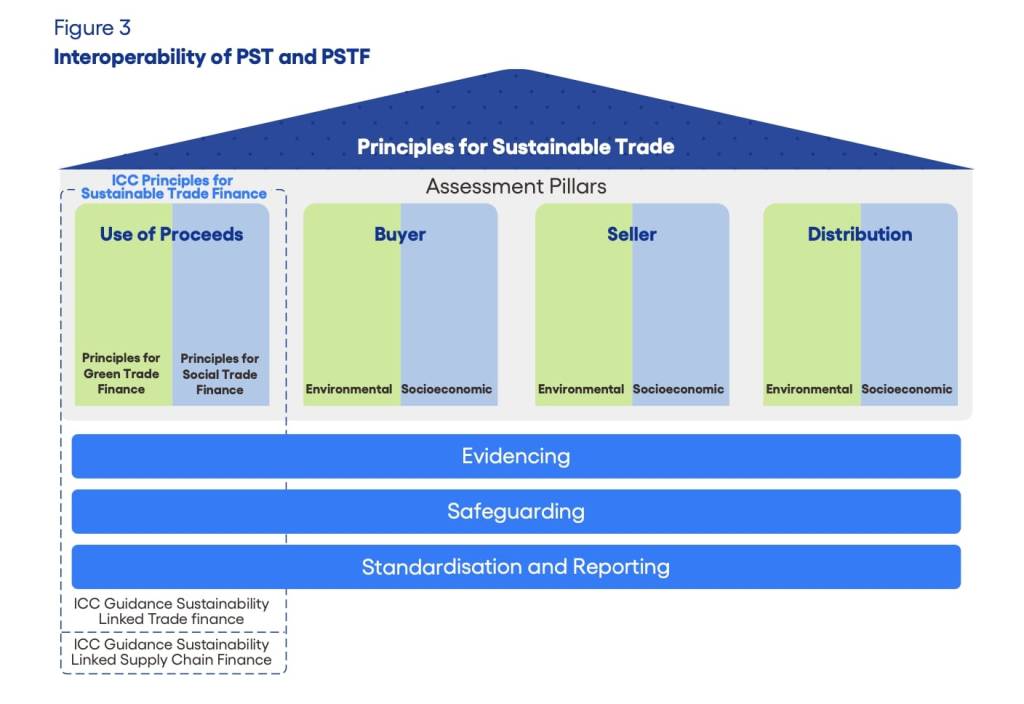Estimated reading time: 3 minutes
- The International Chamber of Commerce (ICC) has introduced the third wave of its Principles for Sustainable Trade.
- This latest update incorporates feedback from over 30 leading banks and corporations.
- It strengthens the guidelines by considering their applicability to promoting sustainability.
The updated Principles for Sustainable Trade offer more actionable guidance for assessing the sustainability of trade transactions. They have been designed to be sector-agnostic, allowing banks and corporates alike to easily integrate these guidelines.
“The Principles are designed to enable the industry to accurately assess and incentivise sustainable trade, building more resilient supply chains, and ensuring that trade plays a key role in meeting the Paris Agreement goals,” said John Denton, Secretary-General of the ICC.
Following feedback from stakeholders, Wave 3 simplifies many of the processes included in the previous version, such as the Use of Proceeds assessments, to ensure accessibility by everyone in the industry. A reworked way to divide assessments into Principles and Guidance on Methodology makes it easier to understand the underlying ideas behind each assessment through Principles and implement change through the recommended methodology. A key highlight is the newly released Principles for Sustainable Trade Finance (PSTF), launched at Sibos 2024, which provide industry-tailored instructions on aligning trade finance activities with both environmental and socioeconomic sustainability goals. PSTF are integrated into the Principles of Sustainable Trade and address sustainability challenges uniquely faced by trade and supply chain finance firms, incorporating them into the wider framework while accommodating the specific requirements of the industry.

“The Principles for Sustainable Trade have been designed to be sector-agnostic, allowing banks and corporations to easily integrate the high-level guidelines into their operations,” explained the ICC. “Significant enhancements, such as improved assessments for Use of Proceeds and Distribution, reflect the valuable feedback gathered during the Wave 2 pilot program.”
The Principles cover four core components – Use of Proceeds, Buyer, Seller, and Distribution – enabling comprehensive sustainability evaluations in line with established frameworks like the Loan Market Association Green Loan Principles. This holistic approach aims to support global efforts in meeting the Paris Agreement targets, decarbonising trade activities, and advancing the United Nations Sustainable Development Goals.
Each activity will be measured along two dimensions, environmental and socioeconomic, and graded one of four levels – sustainable with a high degree of confidence, partly sustainable, unsustainable with a high degree of confidence, or unknown. This grading system is intended to combat greenwashing and improve transparency, lending credibility to companies that make genuine efforts to be environmentally and socially sustainable.
To ensure the continued relevance and practicality of the Principles, the ICC will be launching a new pilot program following the Wave 3 release. This collaborative initiative will involve testing the guidelines on real-world trade transactions and gathering feedback from leading industry professionals. Additionally, the ICC is conducting a survey to gather further insights and recommendations from trade practitioners.
“The Principles for Sustainable Trade represent a significant step forward in driving global trade sustainability,” said the ICC. “By providing simplified, yet flexible guidance, we empower banks and corporates to seamlessly integrate sustainability considerations into their trade activities, ultimately contributing to a more environmentally and socially responsible global economy.”
This announcement is all the more relevant as the impact of climate change is keenly felt around the world this week. Flash floods in Spain partially caused by global warming killed hundreds of people, while the Eastern United States is still reeling from the impact of Hurricane Helene, which left thousands homeless and disrupted supply chains for months. Global trade is responsible for almost a third of global greenhouse gas emissions, and reducing its impact on the environment will be essential to ensure the 1.5°C limit set by the Paris Agreement is not exceeded.





























